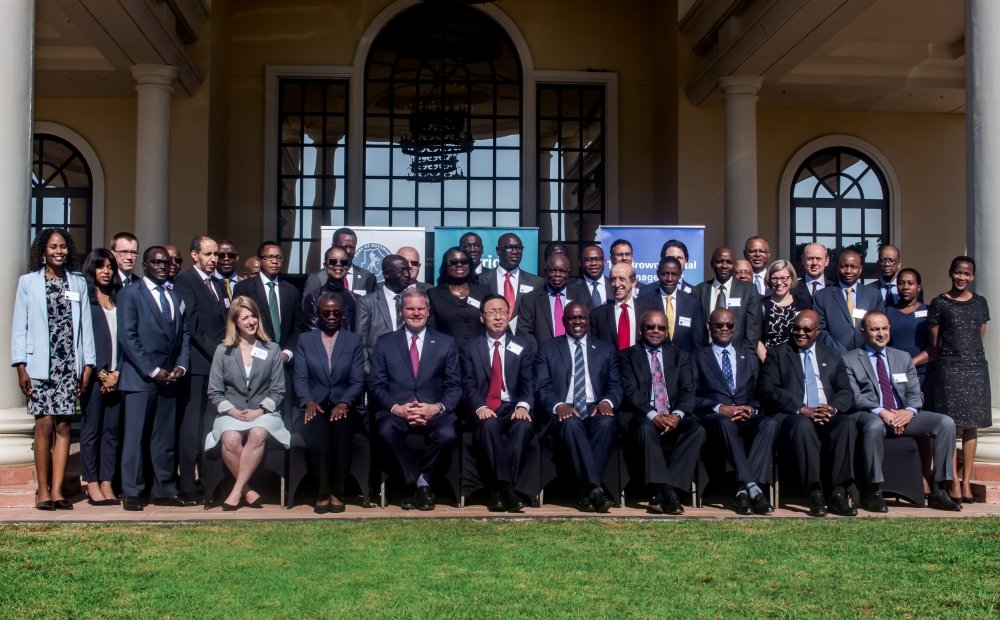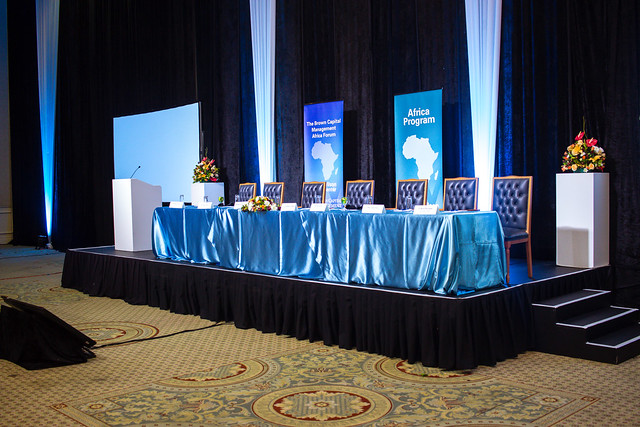Sovereign Wealth Funds in Africa: Policies and Best Practices for Securing the Future (Gaborone, Botswana)

The Program and the Participants:
Heads of African sovereign wealth funds (SWFs), subject matter experts, and senior policymakers met in Gaborone, Botswana from 9 to10 May for a high-level meeting on “Sovereign Wealth Funds in Africa: Policies and Best Practices for Securing the Future.” This meeting, a partnership between the Wilson Center and the Bank of Botswana, under the banner of the Brown Capital Management Africa Forum sponsored by Brown Capital Management, LLC, marked the Africa Forum’s debut on the continent. This meeting was the second in the series building on the successful dialogue at the 2016 Brown Capital Management Africa Forum signature event “Long-Term Sustainable Development in Africa: the Role of Sovereign Wealth Funds” which was hosted in Washington, D.C.
H.E. Dr. Mokgweetsi E.K. Masisi, President of the Republic of Botswana, officially opened the meeting at a ceremony attended by over 130 stakeholders from the public and private sectors, including members of the international diplomatic corps, multilateral organizations, government officials, the private sector, and the media. President Masisi’s presence spoke to the increasingly important role of sovereign wealth funds in Africa, as well as Botswana’s leadership as the first African country to establish a sovereign wealth fund. Mr. Moses Pelaelo, Governor of the Bank of Botswana, welcomed delegates to Botswana. Mr. Jingdong Hua, Vice President and Treasurer at the World Bank delivered the keynote address. The opening ceremony also featured Ambassador Craig Cloud, U.S. Ambassador to the Republic of Botswana, Mr. Eddie C. Brown, Member, Wilson Center National Cabinet, and Founder, Chairman, and CEO, Brown Capital Management, LLC, and Dr. Monde Muyangwa, Director, Africa Program, Wilson Center. The opening ceremony broadcasted on Botswana Television (BTV).
Sixty delegates from 15 countries participated in the core deliberations over the course of the two days. They included CEOs of African SWFs as well as senior officials from African countries with established sovereign wealth funds and from countries currently in the process of establishing such funds including Botswana, Egypt, Ghana, Kenya, Mauritania, Nigeria, Rwanda, South Sudan, Uganda, and Zimbabwe. Delegates included representatives from the United States Government as well as multilateral organizations including the World Bank, the African Development Bank, the United Nations Development Programme, and the United Nations Economic Commission for Africa. Subject matter experts and practitioners hailed from the Africa Center for Strategic Studies at the National Defense University, American University (United States), the International Forum of Sovereign Wealth Funds, Maastricht University (Netherlands), Africa investor (Ai), and Summa Ltd. As the host country, Botswana had representatives from a number of public and private institutions including the Bank of Botswana, Business Botswana, Botswana Pension Fund, the Ministry of Finance and Economic Development, Botswana Development Cooperation, Financial Institutions Regulatory Authority, Botswana Institute for Development Policy Analysis, the Financial Intelligence Agency, and the University of Botswana.
Following a visit to the Diamond Trading Company Botswana, the closing ceremony and press conference, the meeting concluded with an official dinner hosted by Botswana’s Minister of Finance and Economic Development, H.E. Mr. Ontefetse Kenneth Matambo on 10 May.
Meeting Objectives and Outcomes:
The two days provided for robust and in-depth discussions related to the key issues facing African sovereign wealth funds. With at least 14 sovereign wealth funds on the continent, participants took stock of the current state and landscape of African SWFs to assess successes, challenges, lessons learned and best practices. In particular, discussions focused on key issues related to the governance of SWFs including transparency, leadership, and accountability. Discussions also touched on how SWFs can serve as catalysts for Africa’s development including through infrastructure development, balancing the demands of financial and social returns, and by developing public-private partnerships, and working to crowd-in capital. Looking beyond Africa, delegates and subject matter experts reflected on the experiences and lessons learned from other regions to determine lessons learned and best practices that could be adapted to Africa’s context and needs. The meeting also discussed the new U.S.-Africa strategy and its focus on the economic dimensions of the U.S.-Africa relationship and how African SWFs might fit into that strategy. Most importantly, the delegates developed practical recommendations for addressing both governance and development issues, including through the development of policy and regulatory frameworks, collaboration and cooperation, as well as capacity building to consolidate and expand progress for African SWFs. Several delegates called for the continuation of this dialogue as a series focused exclusively on African sovereign wealth funds. The meeting outcomes document, including recommendations and options, can be found here: https://www.wilsoncenter.org/publication/key-outcomes-the-high-level-meeting-sovereign-wealth-funds-africa-policies-and-best.
Hosted By

Africa Program
The Africa Program works to address the most critical issues facing Africa and US-Africa relations, build mutually beneficial US-Africa relations, and enhance knowledge and understanding about Africa in the United States. The Program achieves its mission through in-depth research and analyses, public discussion, working groups, and briefings that bring together policymakers, practitioners, and subject matter experts to analyze and offer practical options for tackling key challenges in Africa and in US-Africa relations. Read more

